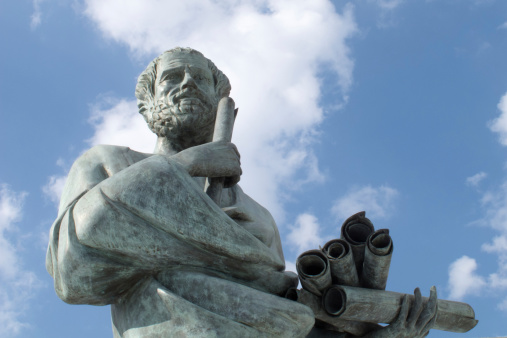
The very popular approach to living a quality life for most human beings is mostly this question to the self- “What should I do?”. However, this approach has been modified a little by many philosophers and has been looked at like- “What kind of person should I be?”. These thinkers have often drawn on virtue ethics for answers. Aristotle, one of the ancient and greatest thinkers of all times, provided a comprehensive system of virtue ethics for common reference which are also known as the 12 virtues of Aristotle.
Table of Contents
Why is it important to be virtuous?

In his Nicomachean Ethics, Aristotle states that humans are rational and social animals who seek to “live well”. The polymath also argued that the man who possesses excellence of character would have a tendency to do the right thing at the right time and in the right way. Thus, he put forward a system of ethics to achieve eudaimonia, commonly translated as happiness or “human flourishing”.
Eudaimonia is achieved by living a virtuous life and refining your character for as long as you are not well-equipped to make the right choices and decisions before even having to reflect upon them. It means you reach a state in life where there are remote chances that you will make a wrong choice due to fault in character or inability of decision-making. You have shaped yourself in such a manner that you do not even need to think about how to be virtuous or how to live an upright life because you are already living one.
People often tend to confuse happiness and pleasure. There is a distinct, well-defined boundary between the two and you should always keep that in mind. A happy person is not the same as a hedonistic person and both are not happy in the same way because the definition of “living well” is diametrically opposite for both. A happy person, according to Aristotle, will strive for self-improvement and holistic development of character. They will be an inspiration for others and will flourish in their lives.
What are virtues?

Aristotle defines virtue as characteristics and tendencies in an individual that causes them to act in a particular manner. We inculcate virtues by patience and by emulating ‘moral exemplars’ until it has been internalized. We become just by practicing justice, truthful by practicing truthfulness and honesty, courageous by practicing courage unless it becomes a habit, unless these virtues become an extension of ourselves.
He also states that each virtue is a “golden mean” between the vice of excess and its deficiency. Talking about courage, if we possess the vice of deficiency, we will not have the courage to overcome any obstacles that cross our paths but if we have the vice of excess, then we will be courageous to the extent of foolishness. Aristotle regards both traits as vicious. A virtuous man, according to him, would know exactly where and when to be courageous without bringing danger upon himself.
12 Virtues of Aristotle

Aristotle, in his Nicomachean Ethics, lists the following 12 virtues-
Aristotle’s 12 Virtues:
1. Courage
2. Temperance
3. Liberality
4. Magnificence
5. Magnanimity
6. Patience
7. Truthfulness
8. Wittiness
9. Friendliness
10. Shame
11. Justice
12. Modesty
- Courage- It is also known as fortitude. Aristotle says courage is “observance of the mean with regard to things that excite confidence or fear, under the circumstances which we have specified, and chooses its course and sticks to its post because it is noble to do so, or because it is disgraceful not to do so.” It is a middle ground between cowardice and foolhardiness. The courageous person is aware of the dangers that are to come his way but chooses to face them, nonetheless.
- Temperance- This is one among the 4 cardinal virtues. By this, he means moderation or self-restraint to a decent extent. It lies between overindulgence and abstinence. For him, the man who drinks too much ad the man who never drinks, are equally insensitive. Controlled drinking is what he would call virtuous.
- Liberality- The goal of this virtue is to reach the golden mean between giving all you have and being a pinchpenny. This is the virtue of charity.
- Magnificence- This is the virtue of living extravagantly. It is the midpoint between vulgarity and severe austerity. Aristotle deems that man virtuous who does not abide by a code of severe self-discipline but knows where to draw the line.
- Magnanimity/ Pride- This is the virtue related to pride. The golden mean of this virtue is to recognize your abilities and have a sense of self-worth, but this self-satisfaction should not be raised to the level of extreme narcissism and delusions of grandeur. This virtue enables you to act according to your self-worth and strive for greatness.
- Patience- Again, this virtue teaches and conditions you not to lose your temper very often. However, a patient man knows when to actually get angry. The whole art is to strike a balance between the two extremes.
- Truthfulness- This is the virtue that advocates honesty. The man who is truthful lies between the vices of being an effortless liar and undiplomatic.
- Wittiness- This virtue relates to a good sense of humor and intellect. The golden mean of wittiness is in between boorishness and buffoonery.
- Friendliness- Friendship might be considered as a waste of time by many of us but you would be surprised to know that Aristotle assigned a very important position to friendship in a happy and virtuous life. The midpoint of the virtue of friendliness lies between being too friendly and being totally ignorant about friendship.
- Shame- Again, the golden mean of this virtue is situated somewhere between being shameless and being too shy. It is all about understanding when and about what to be shameful. This is especially applicable when a person has committed a moral or social error.
- Justice- Justice is another cardinal virtue. Aristotle says that- “It is in justice that the ordering of society is centered” and quite justifiably so. He believes that fairness and lawfulness should always prevail in every society and that being said, every human being must demonstrate equality in their actions and behaviour and redress inequality and unjust practices. It lies between being selfish and being completely selfless.
All of us struggle while dealing with one virtue or the other but that is the whole point of it. Mastering all of the 12 virtues of Aristotle is a different bag altogether and his goal was to drive all human beings to strike a fair balance so that they, as individuals can build healthy societies filled with virtuous individuals. In order to live a meaningful life, it is necessary to understand the cardinal rules and practice stoicism in our daily life
Also Read: 4 Cardinal Virtues- Aristotle and Plato
Download the Evolve App to know more about us and try out fun journeys for self-improvement.
Colours of Meditation: What do Colors Mean During Meditation Made Easy For You!
|
0 comments
mindfulness
Waves of Pleasure During Meditation
|
0 comments
mindfulness
How Long Does Meditation Take To Work
|
0 comments
Self Esteem
How To Build Confidence? Use These Simple Confidence Building Activities For Adults
|
0 comments

mindfulness
How To Use Meditation To Overcome Grief
|
0 comments

mindfulness
Guided Meditation vs Self-Guided Meditation
Damayanti Dubey is a final year English major at Loreto College, Kolkata. She is a writer by passion and loves to indulge in languages, especially English, Bengali, and Urdu. She aims at exploring all of their intricacies and nuances. Damayanti is a disciple of Padma Bhushan Pandit Ajoy Chakraborty and is a national scholar of Indian classical music. She has always believed that a sound mind, free from the clutches of regressive and negative thoughts is the key to living a healthy life and makes efforts to promote mental wellness through the power of her words.
Damayanti believes in thinking beyond boundaries.
